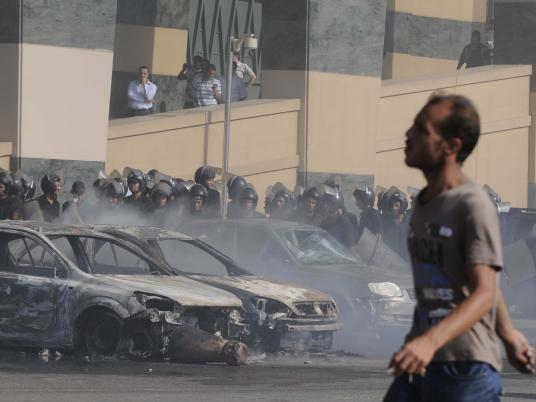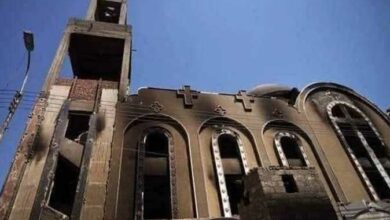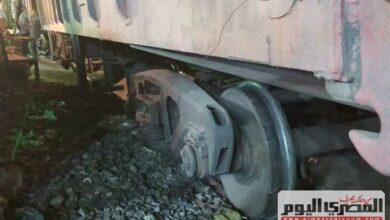
Ever since the revolution forced the police from the streets, the country has been plagued by a security vacuum and, as a result, a sharp increase in crime.
However, different districts have been affected to varying degrees. Magda Boutros, researcher on police reform at the Egyptian Initiative for Personal Rights, said the selective nature of the security vacuum is determined to a large extent by patronage networks.
“If you know people in the police force, you have a better chance at a proper response,” she said.
Imbaba
A gun battle raged in Imbaba on 8 July, leaving one dead and several wounded, residents of the working-class Cairo neighborhood said. Police arrived at the scene more than an hour after a feud between two families had escalated into a fully fledged gun battle.
“We’re used to this,” said Ramy Sezar, a 25-year-old who works in a slaughterhouse. “The police will say it openly in your face: ‘We don’t care. Call us back when we can come and pick up the dead.’”
Sezar said drug dealing has increased sharply in the neighborhood. While secrecy was required before the revolution, it now happens overtly.
“It’s not that we accept the sight of drug dealing in our neighborhood — we have no choice. The police are bribed by drug dealers, so the only law that exists here is that of the strong. When they do come, they just perform their routine. They’ll randomly arrest a few kids, even if they didn’t have anything to do with the fighting,” he said.
Sezar has also gotten used to the sight of weapons in the street, ranging from pocket knives to shotguns.
Aya Abdel Aziz, 24, was cynical.
“We are better off now. At least the government can’t come and harass my brothers anymore,” she said, referring to the oft-mentioned practice of arbitrary arrest.
The reason for this, said Ahmed Magdy, 28, is that the police are no longer feared.
“Before the revolution, people would run away as soon as security forces showed up. Now they fire back at them,” Magdy said.
Boutros agreed. She said the mutual distrust between people and police has been exacerbated because attacks on the police have increased, and “especially because nothing in the way the police behave has changed.”
Ramlet Bulaq
On the other side of the Nile lies the slum of Ramlet Bulaq. Some 300 families live in ramshackle houses. The slum lacks sewers and depends on a single tap at the entrance for water.
The Nile City Towers, adjacent to the slum, provide for a sharp juxtaposition; they are home to prestigious businesses, the top-end Fairmont Nile City hotel and a mall.
On 2 August, the slum was a battlefield after one of its resident, Amr a-Bunni was reportedly killed inside the Nile Towers after a fight erupted when he was refused pay he had earned for providing temporary security work there.
On 27 June, several homes were destroyed as a fire raged through the area, injuring at least 15 people. A boy, 5-year-old Ammar Mohamed Salah, died of his wounds later in the evening.
The fire reportedly started after a gas cylinder exploded and spread rapidly in the densely built houses made mostly of wood. Nile City security initially refused to turn on the water, allowing the fire to rage until fire trucks arrived more than an hour later. It remains unclear whether the boy could have been saved by a quicker response.
When news of his death reached the slum residents, they angrily attacked the towers with stones. However, they were quickly stopped by the Central Security Forces, which had already deployed seven trucks to protect Nile City.
The boy’s father, who now sleeps in the street with his wife and two children, said he feels abandoned by the government.
“There is no care, no one pays attention to us,” the boy’s father, Mohamed Salah, said.
Earlier, in the second week of June, a gun battle in the slum left dozens injured. Children and the elderly were not spared the birdshot fire that flew over the slum for three days. The day after the fighting ended, Egypt Independent spoke to residents of the slum.
Nihmido Husein Yunis angrily recalled that residents called the neighborhood police department the very first day, but they never came.
“I brought wounded people and bullets with me to the department as evidence, but they never do anything for us,” she said, proffering empty shotgun cartridges.
Mohamed Sayed, a 24-year-old whose body was sprayed with birdshot wounds, pointed out what seemed to be the mantra of the slum, resembling that of Imbaba.
“The strong dominate the area because they know the police will never come during the fighting. They’ll tell you to call them when it’s over. Then they come, bury the dead, treat the wounded and arrest a few,” he said.
On 17 June, a week after speaking to Egypt Independent, Sayed was killed with two shots to the stomach. His father said Sayed fought with youth from a neighboring slum who were causing trouble in Bulaq. They subsequently returned with a pistol.
“We had already called the police before this happened, but they never came,” said Sayed Abdel Fattah, Mohamed’s father.
The central security officers, meanwhile, stood around trucks nearby, ready to respond to any threat to the towers. Mohamed Sayed’s sister rushed at the soldiers in tears, screaming, “Where were you dogs when people were killing each other off here? Fuck the government!”
“You see, when we are dying, they don’t care, but when the hotel is under attack they come in big numbers,” said Sayed Battah, who lives in Bulaq.
Boutros said these patterns existed before but have increased in gravity since the revolution.
“The security vacuum is selective to a large extent. It is only a minority that have enjoyed a proper response from security forces, either because they have connections inside the police or because they are seen as more important, like tourists,” she said.
Boutros said those who are well-connected are mostly “people with a better standard of living, like wealthy businessmen who have the leverage to put the police under pressure.”
A retired policeman who spoke on the condition of anonymity, explained how the police traditionally is more sympathethic to the well-to-do. “There is nothing new here. You have to put into consideration also that the police are sometimes fearful of the violence in lower-income and popular neighbhorhoods,” he said.
Even though discrimination of this type exists, Boutros added, people in both well-off and poor neighborhoods have felt increasingly unsafe. There have been several high-profile crimes involving wealthy victims. But it is especially those areas that historically have strained relationships with security forces that have been affected most, sometimes to the extent that “there is no crime prevention at all,” she said.
Currently, there are no reliable statistics mapping out police performance or crime rates by district.
Prospects under Morsy
It remains unclear, Boutros said, whether President Mohamed Morsy will be able to deliver on his promises of restoring security. Either way, Egypt has seen an increase in reported incidents of torture in prisons and fabrication of false charges by police officers.
More importantly, “the government has been increasingly securitizing socioeconomic problems,” Boutros said. Public policy issues are effectively delegated to the security forces, which in turn toughen measures against street vendors and slum dwellers.
Simply increasing police presence in the streets, as Morsy has promised, will thus not suffice, Boutros said. Providing security for Cairo’s poor will require changing the basis on which the security apparatus interacts with them.
Boutros was skeptical.
“The police will continue using the repressive methods they have for decades. It will be hard for Morsy to fight this tendency. Corruption and bribery are still widespread,” she said.




